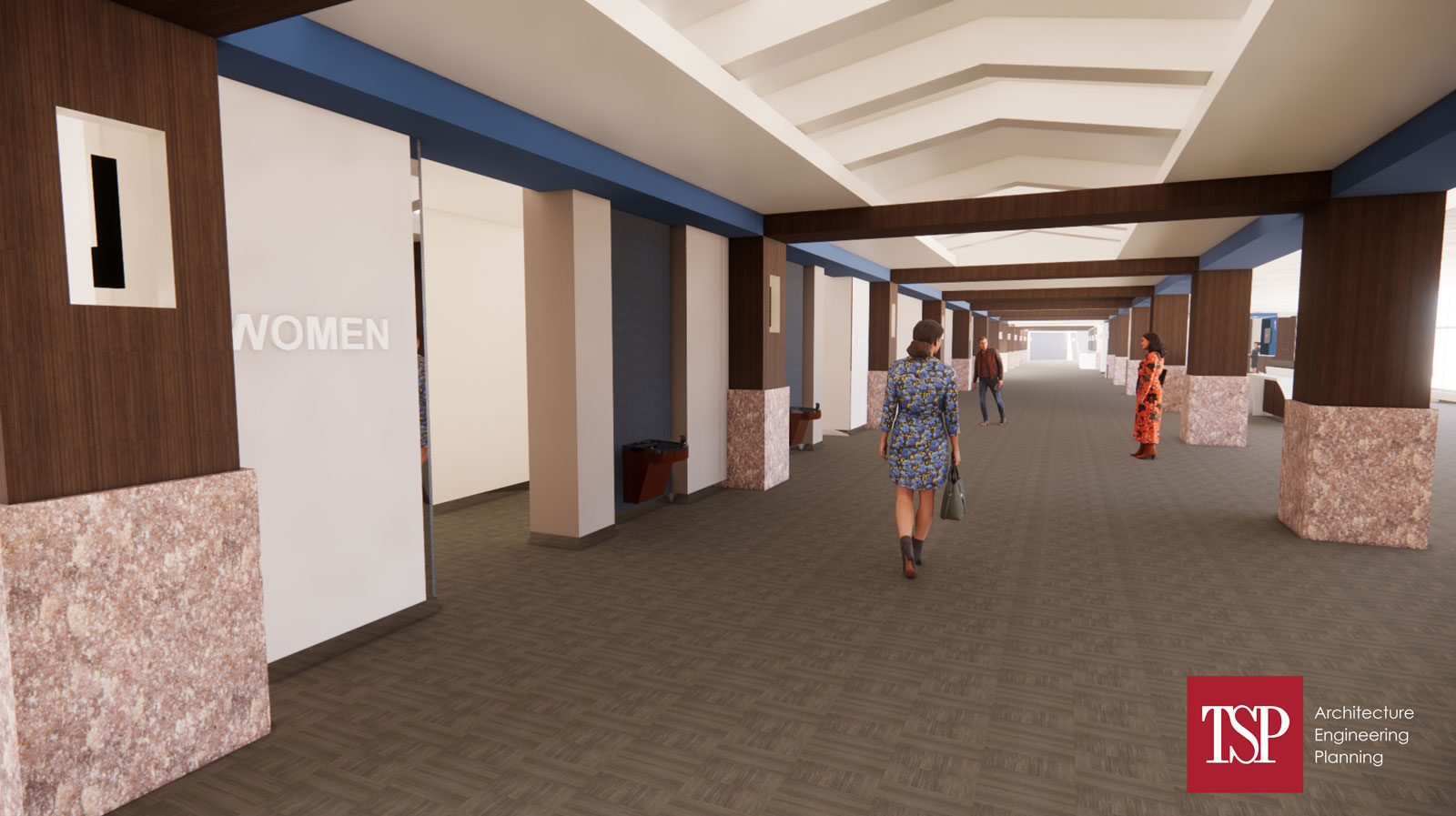The Sioux Falls Regional Airport already has family toilet rooms on the main level of the terminal, and they’re a welcome sight for parents traveling with several young ones or their slightly older, different-gendered children. The revamped concourse will add a family room near Gate 5 as well. Letellier acknowledges one “probably isn’t enough” to serve the entire concourse, but it is a start. The family restroom is part of the push to provide services where and when travelers need them.
Airlines typically advise passengers to arrive at their gates at least an hour before departure for domestic flights. Ensuring access to needed facilities helps encourage a smooth wait. It also removes the stress of racing down to the main level and getting back through security in time.
The concourse’s family restroom will include a universal changing table. That’s a first for the regional hub — and possibly for Sioux Falls too. The equipment isn’t required by current building codes, but the International Codes Council recently approved these tables as a must in the near future: They’ll be required in certain facilities for projects that take place under the 2024 version of the International Building Code.
Also called adult changing tables, these platforms or benches are larger and have a much greater weight capacity than baby-changing stations. Universal tables provide a safe, hygienic and dignified toileting experience for babies, plus anyone who needs assistance with self-care. The floor-mounted or wall-secured tables also are a huge help for caregivers — whether they’re traveling with elderly family members, an older child with special needs or an adult with significant mobility issues because of disabilities or injury.
The upgrade to a universal changing table means Sioux Falls’ travel hub will join the ranks of international airports in Los Angeles, Chicago, Orlando, and Baltimore. Click here to learn more about ADA compliance and TSP’s work to create more inclusive buildings.
“We do hear comments from passengers as well as their relatives or travel companions, and we understand this is a need,” said Dan Letellier, the airport’s executive director. We thought it was important to include in this project. One speaker at a conference I attended has a grown child who requires help, and he’s a strong advocate for adult-assistance facilities. They love to travel, but he talked about how difficult it was. If there are no facilities for her, she has to lie on the floor. No one wants that. But it’s something you don’t think about until it affects you or someone you know.”
Andria Bender is one of those people. Her daughter, Margot, turns 9 this month. Bender’s experiences as a parent and a registered nurse led her to champion some of the first Caroline’s Carts in Sioux Falls Hy-Vee, Target and Walmart stores. She founded Changing South Dakota in 2019 after a family vacation that took her through airports in Sioux Falls and Orlando. The grassroots group is pushing for universal changing tables in every publicly funded building in our state.
“No one wants to lie down on a public restroom floor. No one wants to lay their loved one on a public restroom floor. Right now, that’s the only way for us to care for my daughter, who is too large for a standard baby changing table. Universal changing tables provide a safe, sanitary, private, and dignified way to use the restroom. Just like any other person wants and deserves. I’m hopeful that the addition of a universal changing table at the airport will help others see the need.”
— Andria Bender, founder of Changing South Dakota
“During that trip, I changed my daughter four to five times on bathroom floors at both airports, apologizing to her the entire time,” said Bender, now a stay-at-home mom who also has a 4-year-old son. “I knew there had to be a better way.” She has reached out to state legislators, the city of Sioux Falls’ Commission on Human Relations and area cultural attractions. Without reasonable accommodations, she said, families must invent complicated workarounds or miss out on quality-of-life enhancements in their communities. The ongoing COVID-19 pandemic means she and other high-risk families remain largely sheltered at home rather than add the chance of exposure to an already unsanitary and demeaning experience.
“Most people I talk to have no idea this is a need — that we belong to a whole group of people who keep disposable tablecloths in our bags to lay down on floors. We resort to changing our loved ones in the back of our vehicles or on park benches in full view,” Bender said. “Even close family and friends didn’t understand. We plan our outings around if we’ll have time to stop home. We scope out the ‘good’ bathrooms, cut visits short or simply do not go out.”

